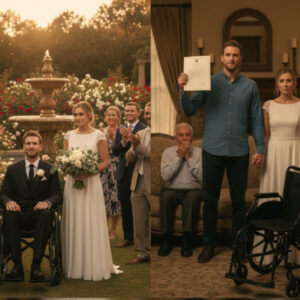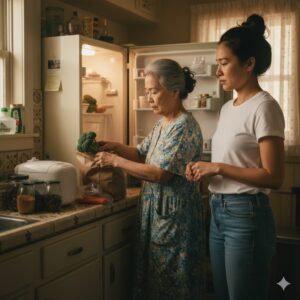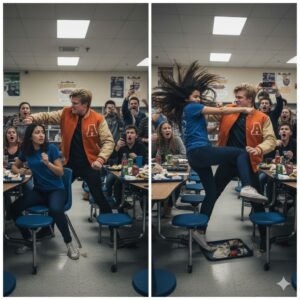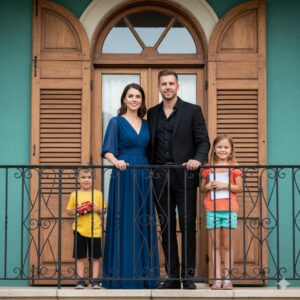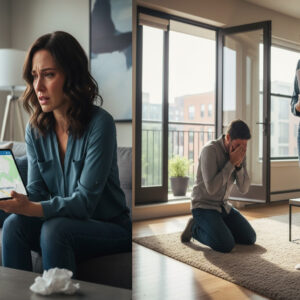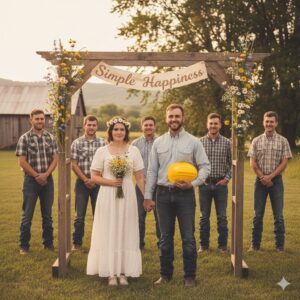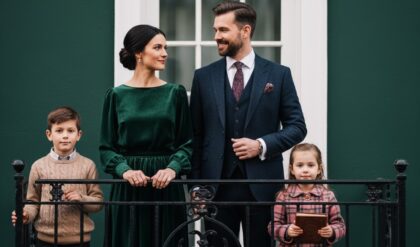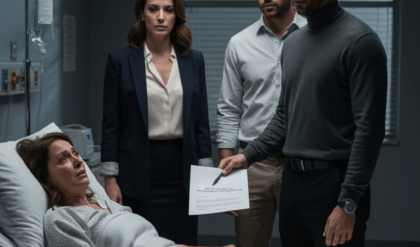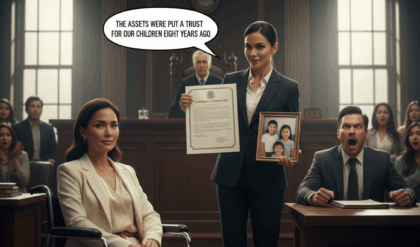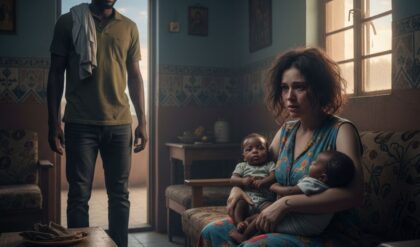A teenager takes lunch to her cardboard-scavenging father without him knowing she’s leaving her school snack
I put the ham and cheese sandwich in my backpack when no one’s looking. My friends are busy talking about the new boy in class, so it’s easy. I wrap the fruit too, and the bottle of juice Mom made this morning.
“Aren’t you going to eat, Mili?” Miss Claudia asks me during recess.
“I already ate at home,” I lie, feeling my face burning. “I got up late and just had breakfast.”
She looks at me with those eyes that seem to see everything, but she nods and goes to watch the second-graders who are running around like crazy near the windows.
When the bell rings, I walk quickly through the streets to the avenue. There he is, with his cart full of stacked cardboard boxes, his dirty cap blocking the sun, his T-shirt stained with grease. My dad. Sometimes I want to hide, so no one at school sees me like this, but then I feel horrible for thinking about it.
“Dad!”
He turns around and his face lights up, even though he’s tired. He’s always tired.
“Mili, my love. What are you doing here? I should be home doing homework.”
“I was just passing by,” I say, taking out the package wrapped in napkins. “I brought you something.”
“What’s this?”
“Food. Have a little lunch, Dad. It’s hot, and you’re out all day.”
He looks at the package, then at me.
“Mili… this is your school snack, right?”
“No, Dad. I had some left.”
“Don’t lie to me, fatty.” His voice is soft but firm. “Did you eat?”
I stay silent, looking at my torn sneakers.
“Mili, look at me.”
I look up, and his eyes are shining.
“I don’t want you to do this, my love. You have to eat. You’re still a little girl, you’re growing.”
“I’m fourteen, Dad. I’m not a little girl.” My voice cracks. “And you have to eat too. I saw you yesterday… you barely touched your plate at dinner.”
He sighs, takes off his cap, and runs his hand through his hair.
“I wasn’t hungry, Mili.”
“Liar.” Now I’m the one speaking firmly. “You saved your portion so Mom and I could eat more. You think I don’t notice, but I do.”
There’s a long silence. A car drives by honking, a woman looks at us out of the corner of her eye.
“Oh, my love.” Dad hugs me tightly, smelling of sunshine and cardboard and that cheap soap we use. “It shouldn’t be like this. You should be worrying about school tests, about boys, about all that teenage nonsense. Not about whether your old man ate or not.”
“But that’s how it is, Dad.” I lean against his chest. “And I don’t care. I can skip a snack. We’ll have dinner at home anyway.”
“No, miss. You’re going to eat this right now, in front of me.”
“Dad…”
“Now, Milagros. Or I’ll get really mad.”
I take out the sandwich and cut it in half. I give him one part.
“Half and half. Or I won’t eat.”
We stare at each other, both stubborn, both the same. Finally, he smiles faintly.
“You took after me, stubborn.”
“And proud.” —I smile back.
We eat there, on the sidewalk, sitting on the curb next to his cardboard cart. People pass by and stare at us, but I don’t care. He’s my dad. And tomorrow I’m going to bring him lunch again, even if I have to make up a thousand excuses at school.
Because that’s what we do in this family: we take care of each other.
The next day, I woke up before Mom. I prepared my snack as usual, but this time I added a piece of cake left over from dinner. “So Dad can have something sweet too,” I thought, wrapping it in aluminum foil.
At school, everything was the same: the kids laughing, Miss Claudia saying we had to study for the history test. I couldn’t concentrate. I kept looking at my watch, waiting for the bell to ring so I could go see him.
When I finally got out, I ran the three blocks to the avenue. But my dad’s car wasn’t there.
I waited.
The minutes dragged on. The garbage collectors, the street vendors, the flower man passed by… but not him.
“Maybe he went to another street,” I told myself, although something in my chest began to tighten. I walked several blocks, asking the other cartoneros if they had seen him. One of them, Don Alfredo, looked at me sadly:
“Your old man was here earlier. He said he felt a little dizzy. He must have gone home to rest, babe.”
I ran back, my backpack bouncing against my back and my heart pounding in my ears.
When I arrived, Mom was standing in the doorway, pale.
“Where were you, Mili?” he asked, his voice breaking.
“I went to look for Dad… what’s wrong?”
She didn’t answer right away. She just hugged me tightly. Then I saw the ambulance stopped in front of the house.
“He fainted on the street,” she said finally. “The heat, the exhaustion… They took him to the hospital.”
The breath left my body.
That night, the hospital smelled of disinfectant and fear. Dad was lying down, with an IV in his arm, his eyes closed. Mom let me in for just a little while.
“Don’t be scared,” he said. “He’s weak, but he’ll be okay.”
I approached slowly. I took his hand.
“Hi, Dad,” I whispered. “I brought you the same sandwich, but this time you’re going to eat it when you wake up. The whole thing, okay? No more leaving me half.”
A nurse who heard smiled tenderly.
“Are you his daughter?” she asked.
I nodded.
“You have the same eyes.” She stroked my shoulder. “Your dad never stops talking about you when he’s awake. He says you’re the pride of him.”
I stayed there, my throat tight, until Mom took me out to let him rest.
The days passed slowly. Dad was getting better. Every afternoon, after school, I went to the hospital. I told him gossip about the course, read aloud to him, and sometimes we sang softly so the nurses wouldn’t scold us.
One afternoon, when he was almost discharged, he looked at me with a seriousness I didn’t know he had.
“Mili, when I get out of here, I’m going to look for another job.”
“But, Dad, you say that cardboard is the only thing you know how to do.”
“No, my love.” He squeezed my hand. “It’s the only thing I dared to do. But if you, at fourteen, have the courage to bring me food even if you’re embarrassed or challenged, how could I not have the courage to start over?”
I didn’t know what to say. I just smiled at him.
Weeks later, I saw him for the first time wearing a new shirt, the same one Mom ironed over and over again to make it perfect. He had gotten a job at a recycling warehouse, with fixed hours, a steady salary, and less weight on his back.
“It’s not much,” he said, “but now I’m going to be home to have dinner with you and Mom.”
That night, the three of us sat at the table. I served the food. Dad ate his entire plate and even got seconds. And when he finished, he took something wrapped in newspaper out of his pocket.
“This is for you, Mili.”
It was a small, old metal medal with a blurry drawing.
“I found it among the cardboard boxes a while ago,” he explained. “I wanted to keep it because it reminded me of you. It says ‘strength and light.'”
I squeezed it in my hand.
“Thank you, Dad.”
He smiled at me.
“Thank you, my love. If it weren’t for your hidden lunches and your stubbornness, I might never have realized how much I’m worth.”
The next day, when the recess bell rang, Miss Claudia saw me putting the sandwich and fruit in my backpack.
“Are you going to take food to your dad again?” she asked.
I nodded, smiling.
“Yes, but now we both eat.”
She smiled back.
And as I walked down the same avenue as always, with the sun beating down on my back, I thought that life was still hard, yes, but it didn’t hurt as much anymore.
Because in my family we continued doing what we did best: taking care of each other, together, until everything started to shine again.
News
Marrying a rich disabled husband to pay off debt to “save” her father, she was looked down upon by her husband’s family for 7 years. One day, he stood up and walked. His first words left the whole family speechless./hi
Marrying a rich disabled husband to pay off her father’s debt, she was despised by her husband’s family for 7 years, until one day he stood up and walked, his first words left the whole family speechless Seven years ago,…
Every week my mother-in-law comes to my house 3 to 4 times, every time she cleans out the refrigerator, gathering all the food for her sister-in-law. Too dissatisfied, I quietly put something in the refrigerator that makes her tremble with fear./hi
Every week, my mother-in-law would come to my house three or four times, and every time she would clean out the refrigerator and take all the food for her sister-in-law. I was so dissatisfied that I quietly put something in…
A Punch. A Pause. And Then? They Realized the New Girl Wasn’t Who They Thought./hi
Bullies Punched a New Black Girl in The Face — Big Mistake… They Had No Clue Who She Really Was The Morning It All Began It was supposed to be just another Tuesday at Westbridge High, a suburban school known for…
One unplanned visit to his maid’s house — one door opened — and a truth powerful enough to shatter his beliefs forever./hi
Without warning, the millionaire decided to visit his maid’s house. He never imagined that by opening that door he would discover a secret capable of changing his life forever. One Thursday morning, with the golden sunlight filtering through the leaves…
My husband said he was on a business trip for 3 days, but the location showed he was at the maternity hospital. I didn’t make a fuss — just quietly did 3 things, causing his life to fall into the abyss of humiliation./hi
My husband said he was going on a business trip for 3 days, but the location showed he was at the maternity hospital. I didn’t make a fuss — just quietly did 3 things, causing his life to fall into…
To legitimize the pregnancy, I agreed to marry a worker. But when my daughter turned three, I was stunned to find something in my husband’s wallet – and then, I understood why he had agreed to marry me all those years ago./hi
To legitimize the pregnancy, I agreed to marry a factory worker. But when my daughter turned three, I was stunned to find something in my husband’s wallet – and then, I understood why he had agreed to marry me. My…
End of content
No more pages to load
